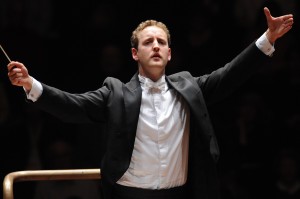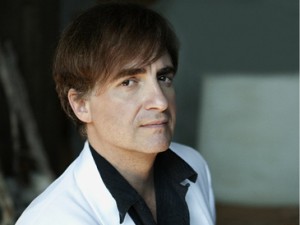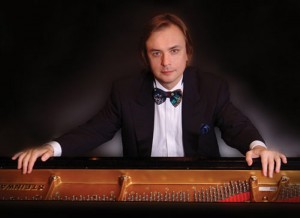
New music, Russian bravura get classical season going
The season proper gets going this weekend with concerts by the New World Symphony (in a “pre-season” free event) and the first concert in this year’s season of eight in the Sunday Afternoons of Music series.
Saturday night, it’s the young British conductor Michael Francis leading the fellows of the New World in music by Dvorak, Rodrigo and a new work by the American Jeffrey Mumford, whose A Dance Into Reflected Daylight is getting its world premiere performance.
Mumford’s piece is another in the series of Sphinx Organization multiple-orchestra commissions that will see the work also played by the Detroit, Milwaukee, Cincinnati and Nashville symphonies, among others. The Detroit-based Sphinx Organization promotes African-American and minority participation in classical music; Mumford teaches at Lorain Community College in Ohio and studied with Elliott Carter.
The excellent Cuban-born guitarist Manuel Barrueco is the soloist with the New World in the Concierto de Aranjuez of Rodrigo, easily the Spanish composer’s most familiar composition. Its slow movement, with its obvious-yet-compelling main melody, has been used in all sorts of commercial contexts, and Rodrigo’s light scoring is admirably suited for letting the guitar speak.
The concert closes with Dvorak’s Seventh Symphony (in D minor, Op. 70), which is often regarded as his finest overall by received critical opinion. I personally think the Eighth is a much better piece, but the Seventh is a fine work, with a terrific scherzo that has one of Dvorak’s catchiest tunes, a late Romantic ear worm if ever there was one.
The New World performs at 7:30 p.m. on Saturday, September 22 at its home at the New World Center in Miami Beach. It’s a free concert, and it offers a good chance to hear one of the rising stars of the contemporary conducting generation as well as a new piece of homegrown American music. Visit www.nws.edu for more information.
Maxim Mogilevsky.
The durable Sunday Afternoons of Music series gets under way Sunday with two-piano music by two Russian pianists, playing mostly Russian music.
Maxim Mogilevsky and Valery Kuleshov also will play some solo music, one an arrangement of music by Tchaikovsky, and another a piece by Liszt. Two-piano duos seem to be making something of a comeback these days, with a young duo such as Anderson and Roe making a strong impression in the edgier ranks of today’s classical musicians.
Mogilevsky and Kuleshov are well-established pianists of the Russian school, with substantial, long careers, though their profiles aren’t very high, at least here in the States. Judging by the performances available on their websites, this is unfortunate, because they’re both exciting players in the grand Romantic tradition.
For their program Sunday at the University of Miami’s Gusman Hall, the two will open with the suite from Sergei Prokofiev’s great ballet score Cinderella (Op. 87). The suite has been arranged by the formidable Russian pianist and conductor Mikhail Pletnev, whose arrangements of ballet music by Tchaikovsky have turned up on a number of recitals I’ve been to in the past few years. Pletnev himself recorded it with Martha Argerich, for whom he did the arrangement.
The two will close the concert with the Second Suite (Op. 17) for two pianos of Sergei Rachmaninov, one of the best-known and most-performed of all works in this genre. It always makes a thrilling selection, particularly the last movement, a propulsive, muscular tarantella with the kind of dark, modal color that is one of the most attractive elements of this composer’s music.
Valery Kuleshov.
Mogilevsky will close the first half of the concert with the Scherzo and March (S. 177), of Liszt, a monstrously difficult but hugely exciting piece that the composer penned in 1851 for Theodore Kullak, an important pianist and teacher whose students included some of the best-know virtuosos of the late 19th century (Scharwenka and Moszkowski among them).
This piece was written only a couple years after the death of Liszt’s friend Frederic Chopin, and the March section is clearly influenced by Chopin, much to the music’s benefit. Mogilevsky’s performance of that work can be found here on his website’s audio page.
Kuleshov will open the second half with the Romeo and Juliet Fantasy-Overture of Tchaikovsky, one of his most famous early works, in a transcription by the young Belgian pianist Florian Noack. Just 22, Noack has made a good name for himself in Belgium and Germany, not only winning big prizes but writing effective transcriptions. Like Mogilevsky, Kuleshov has a big technique and he’s able to pull off things like Vladimir Horowitz’s bravura transcription of John Philip Sousa’s Stars and Stripes Forever with aplomb, as he did here in a concert from 2000.
The concert starts at 4 p.m. on Sunday, September 23. Tickets are $35; call 305-271-7150 or visit www.sundaymusicals.org.
Recent Content
-
Artsarticle ·
-
Artsarticle ·
-
Artsarticle ·



